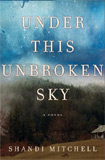Page 3 of 3
There are currently 18 member reviews
for Under This Unbroken Sky
-
Sylvia G. (Scottsdale, AZ)
Too dark to embrace
Under This Unbroken Sky is not for the faint of heart. It is very well written and sustains a high level of suspense, even through scenes of daily domestic routine, as you wait for the tragedy promised on the first page to unfold.The characters are believable and compelling and the setting perfectly rendered. However this novel is saturated in unrelenting grimness. It is bleak and you can taste the desperation of the poor family, who are clearly headed for a catastrophic end. I can't say I enjoyed the book although I appreciated it's artistry.
-
Julie, avid reader, PA
Under This Unbroken Sky
A harsh, bleak picture of life as an immigrant in 1930's Canada. A time when daily life was a struggle and just making a living took everything one had. I did not like the writing style of the book; the sentences were short and choppy. There was little character development. The characters did not seem to have any control over the events in the book, everything happened "to" them. The book succeeded in communicating the harshness of the time period and ultimately showed the resilience of the human spirit. However, I found it too dark and depressing for my tastes.
-
Marion W.
I cannot reconcile Mitchell's account with the people I knew
I really didn't like Shandi Mitchell's "Under the Unbroken Sky"! To me it was just another tale of poverty-stricken misery, like Helen Forrester's memoirs of her Liverpool childhood and Frank McCourt's of his in Ireland.
It's terribly depressing to read of hunger, filth, mental illness, treachery, brutality, hostile people, degradation...on and on and on.
The Canadian prairies are a tough place to live; I know, I was born and lived there for a long time. But the Ukrainian-Canadians whom I knew in Manitoba--of the same generation as those described in Mitchell's book--were resilient, resourceful, humorous, and spirited people, and their children (now in their 60s and 70s) grew up to become doctors, lawyers, artists and musicians, business people. My best friend's mother (raised on a Manitoba farm) bought her own store; she and her husband (who'd fled Ukraine rather than starve under Stalin's repression) raised their five kids in rooms behind this mom-and-pop grocery store. She was also a poet. All five kids attended Ukrainian language classes (as well as good old Lord Roberts School, of course), and all five took music lessons. Four have made music their livelihood at one time or another.
Another woman whom I know, who came to Winnipeg not knowing a word of English, worked in the needle trade, and ultimately bought the apartment building next door to my childhood home.
I cannot reconcile Mitchell's account with the lives of the people whom I knew and admired.
She betrays herself as a Maritimer when she states that the kids didn't attend school because the temperatures hit twenty below. I taught in an elementary school in Winnipeg for three years. We could have indoor recess if, and only if, the temperature went (below) twenty below. (And wind chill wasn't a factor considered at that time!) When the kids (and I, if I were on recess duty that day) came indoors, and they had divested themselves of all their outdoor clothing, and their mittens were steaming atop the radiators, I would have them sit with their palms over their frostbitten cheeks for ten minutes or so while I read them a story. But school (200 days a year) was never cancelled (except one day during a blizzard; I walked three miles downtown and hitched a ride before reaching the school and learning this), and no one ever stayed away because of the cold. This applied to kids living in the country, too, not just city kids; my brother-in-law attended a rural one-room school and also taught in one for four years. He rode an old horse to school in the winters when he was a student and the snow was particularly deep.
-
Laura P. (Atlanta, GA)
How depressing!
This book is a real downer! The central characters, a family of Ukrainian immigrants homesteading on the northern Canadian prairie in 1938/39, are victims of the elements, the government, and each other. Nothing good happens to anyone, I confess I kept reading because I was hoping for a turnaround - some positive event that might give any character a reason for hope. Not one appeared. The author's style is as spare as the landscape - which suits the story, except for her annoying habit of inserting descriptive sentence fragments. When commas would produce grammatically correct sentences.(Like that.) I've read "downer" stories told with humor and enjoyed the presentation,but I just did not enjoy this book.
